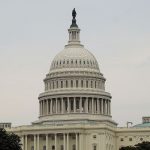At a recent National Prayer Service, Bishop Mariann Edgar Budde took to the pulpit with a bold agenda that caught many off guard. The service, traditionally a solemn occasion, transformed into a platform for the bishop to express her views on President Trump and his administration, leading to a mix of confusion and criticism. The bishop’s sermon wasn’t just a call for prayer; it became a lecture that many found inappropriate for the setting.
In her fiery address, Bishop Budde implored the president to show mercy to those she described as scared and vulnerable, including children from all political backgrounds. Rather than focusing on spiritual themes, she highlighted the plight of immigrants, asserting that most are not criminals. While her intentions may have been noble, they seemed to muddle the purpose of the prayer service, leaving many attendees scratching their heads. One couldn’t help but wonder if she forgot that church is meant to foster a sense of community rather than serve as a stage for political speeches.
President Trump’s reaction to the bishop’s remarks was a mixture of humor and indifference. He later commented that the service could have been better, reflecting a dismissive attitude that left some feeling the sermon missed the point entirely. The president, known for his blunt remarks, opted not to engage deeply with the content, instead labeling it as boring. This response sparked debate over whether he was being wise by ignoring the provocations or if he missed an opportunity for dialogue.
The bishop’s performance stirred up reactions not just from the president but also from various commentators. Some entertained the idea that her sermon was more about activism than theology. They suggested there is a time and place for such discussions, and the pulpit during a prayer service might not be it. Critics argued that her approach could have alienated rather than united. A preacher’s role is to cultivate morals and virtues, not to ignite political flames, they claimed. After all, is the church the right venue for political sermonizing?
Worryingly, this incident reflects a growing trend of using religious platforms for political narratives. While some view this as a sign of the times, others caution that mixing activism with religion can lead to division rather than understanding. The bishop’s call for empathy could have been more impactful if stripped of political context and presented through a spiritual lens, highlighting core tenets of mercy and compassion without drawing lines in the sand.
In a world where politics and faith often collide, this incident serves as a reminder of the delicate balance that must be maintained. While all voices deserve to be heard, utilizing sacred spaces like churches for political commentary raises important questions. With political tensions running high, it may be wise for various factions to consider that not every platform is meant for contentious debates. Instead, some spaces—especially religious ones—should focus on healing, harmony, and shared values rather than rhetoric that may escalate divisions.




